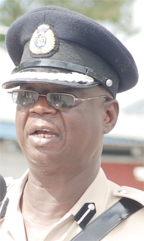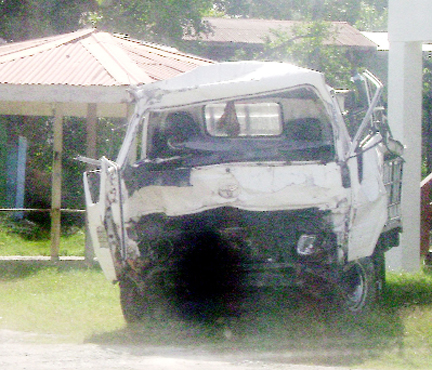… many of the complaints have merit and sometimes I am ashamed, because when I joined the force you had incidents yes but not this blatant corruption by some of the ranks, brutalizing people and behaving as if they are a law unto themselves, the thing I believe has gone out of control
Blatant corruption and other illegal activities in the Guy-ana Police Force (GPF) have gotten out of control, according to outgoing Assistant Commissioner, Paul Slowe who said that the force has to be stripped of rogue elements from top to bottom before its image can be repaired.
This, in turn, will provide the solution to a number of the problems that the force now faces.
The blunt-speaking 55-year-old police officer who has proceeded on two months pre-retirement leave said that at times he was ashamed of the behaviour of some of his colleagues and he hopes that in the near future the force can be returned to the days when it was respected.
In an interview with Stabroek News, Slowe, who has the distinction of being one of the few officers to command respect from a wide
cross-section of the populace, spoke of his 37 years in the force and did not shy away from what some may describe as controversial issues including when he refused to carry out an order by then Home Affairs Minister Ronald Gajraj which would have forced him to act outside of the rules that govern the force.
“… many of the complaints have merit and sometimes I am ashamed, because when I joined the force you had incidents yes but not this blatant corruption by some of the ranks, brutalizing people and behaving as if they are a law unto themselves, the thing I believe has gone out of control,” Slowe told this newspaper.

He said as a senior officer he had been trying to “deal very diligently with those elements and I hope that my brother officers that are remaining will take up the fight to rid the force of those elements, because we don’t need them, they have done a lot of damage to the force and therefore those who remain need to ensure that is one of the foremost projects on their agenda, to tackle the bad elements within the force to make the force the proud organisation it once was,” the officer said.
Slowe called upon the senior officers to lead by example as it is not enough to tell their juniors to “do as I say and not as I do because at the end of the day you might tell them what you want to tell them (and) they see that you are doing something else and therefore they are going to be inclined to do just what you do.”
He said the officers need to ensure that they do the right things and “mix with the right people” and he stressed the point that as an officer of the law one cannot be seen drinking and socializing at all the nightspots around town.
The officer, who has never been one to mince words, said from an early stage he recognized that if he wanted to be a senior officer who was respected “certain places you cannot be frequenting, certain people you cannot hang out with so that is why I have lived the life in the force I have lived.”
He continued that throughout his career he sought to carefully select the people with whom he associated pointing out that if as an officer one visited a popular sporting spot it might appear as if the officer is associating with persons of questionable character merely because the persons are on the same premises as the officer and public perception of that officer automatically changes.
He is of the opinion that back in the day the colonial masters recognized the very issue and that may have been one of the reasons they built messes such as the officer’s mess, the inspector’s and sergeant’s mess and the other ranks bar, “the intention was that when you want to mix and take a drink you go to those messes and you are assured to be associating with the right people.”
“Image for me is everything, if you are able to project the right image as individuals the organisation too will have the right image and in that right image lies the solutions to a lot of the problems that we are facing.”
He underscored the point that if officers have the right image and are respected by society then they will be able to go to citizens and garner information about criminal activities and in some instances citizens are even going to take information to officers because they are respected.
The Ronald Gajraj saga
As testimony to him always acting within the laws of the country, Slowe referred to the incident involving Gajraj who wanted him to return a gun to the owner even though the investigation was incomplete. Slowe, then the commander of the Berbice division, refused and even though it was the beginning of a rocky journey for him, and which he is certain was the reason for him remaining at one rank for 11 years, he said the incident helped to improve his image.
“It [the incident] has done a lot of good for me in terms of image, in terms of being recognized as a person who is willing to do the right thing because I have a suspicion that prior to then people felt that I was one of those persons who would have done whatever I am told to do whether it was illegal or not but I have always maintained that nobody has ever instructed me to do anything that I am not comfortable with…”
The incident occurred in 2003 and at that time Slowe was an Assistant Commis-sioner and today, 11 years later he is retiring at the same rank.
Recalling the incident, Slowe said a young man had suffered a gunshot wound and an investigation was launched resulting in the firearm being seized. Subsequently, it was discovered that another firearm was in the house and he instructed that this also be seized and for it to be tested to determine which one was used in the incident.
“We had an investigation to do and we had to do it properly,” he pointed out adding that after the second firearm was seized he received a call from Gajraj and he explained to him why both weapons were seized. He was then asked when the firearm was going to be returned and he said he was not sure since they were still investigating.
“I think the minister felt that I was being difficult at which stage he said he is ordering me to return the firearm immediately and I reminded him about the protocol and I even suggested to him that he should relate to the commissioner because the Commissioner [Floyd] McDonald had showed an interest in the same matter but he carried on and he carried on the phone,” Slowe recalled.
He said he maintained that the order was not the right thing “and I quite politely tried to remind the minister that I cannot instruct him to carry out an unlawful order” but the conversation ended abruptly and he (Slowe) immediately contacted the commissioner and briefed him of the conversation and at “that time he seemed to have understood.”
However, he said he later received another call from the commissioner who asked him to explain the conversation again and “he was very supportive” initially but during a visit to the commissioner’s office a few days after he was asked to apologise to the minister and he questioned the reason since he had done nothing wrong.
Slowe said he requested to sleep on the issue but the very night the matter was leaked to a newscast and this further upset McDonald who said he should not have discussed the issue but he told him he felt obliged to discuss it with his family and friends. He was later told that President Bharrat Jagdeo wanted to see him and they had a very “nice and cordial discussion” but he maintained that he would not apologise unless he did something wrong and “I think he took a different stance thereafter.” Slowe said Gajraj felt that he was rude to him and as such demanded he apologise and he later wrote a letter to the commissioner explaining the entire matter and to “say if my tone was interpreted to be disrespectful that was not the intention and I was just seeking to give the minister what I thought was professional guidance on the matter.”
Within two weeks he received a letter to report to a unit in the Ministry of Home Affairs for duty and following discussions with many persons including his lawyers he was advised that he should take the matter to court “but they did caution me that should I go to court it meant that the career in terms of upward mobility would have ended.”
But he was prepared to do that “because I think it was the right thing and because I was being bullied” and the matter was taken to court and an injunction was granted prohibiting the authorities from transferring him from Berbice until the matter was heard. A defence was never entered by the commissioner against whom the injunction was issued and when he subsequently demitted office and Winston Felix took over the reins Slowe withdrew the matter and he was then transferred to Georgetown as the Commander of A Division.
Slowe said he is convinced that it was because of this episode that he has not been promoted since, “because in terms of qualification I am qualified.” He said there have been vacancies for Deputy Commissioners for a number of the years and since the retirement of former Deputy Commissioner Edward Wills the force has had no deputy commissioner when the establishment caters for four deputy commissioners.
“The only thing one can conclude is that because of that incident I have not been promoted and time will tell because I have a suspicion, many people would say now that I am going we would see if the vacancies are going to filled and that is going to tell the story…”
Rewarding
But even so Slowe said he has had a very satisfactory and rewarding career one that he cannot complain about as given his background, to enter the force and eventually become an Assistant Commis-sioner is a “fantastic achievement.”
“I have been saying to the younger folks not withstanding your background if you put your mind to it and if you decide to make a change you can make it, not only in the force but in other organizations as well.”
So satisfying was Slowe’s career that should he live this life again he would not hesitate to join the force as he just enjoyed his career not withstanding that he has had bad experiences but as he puts it “life is made up of its ups and downs.”
But fortunately for him his up days in the force were “better and greater and longer than the downs” and he would use the downs as an example to the others that one should always strive to do the right thing.

